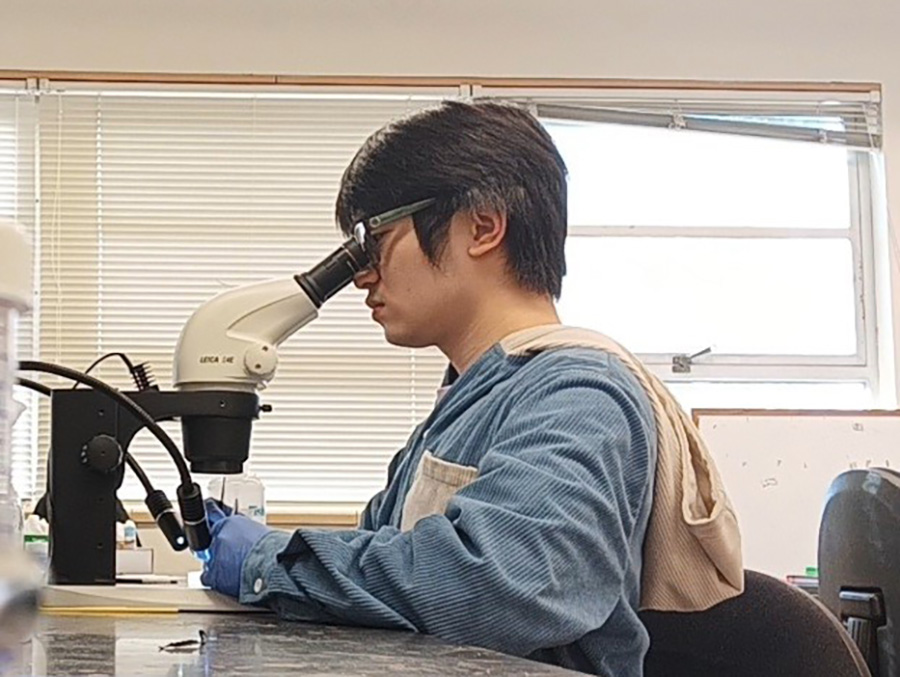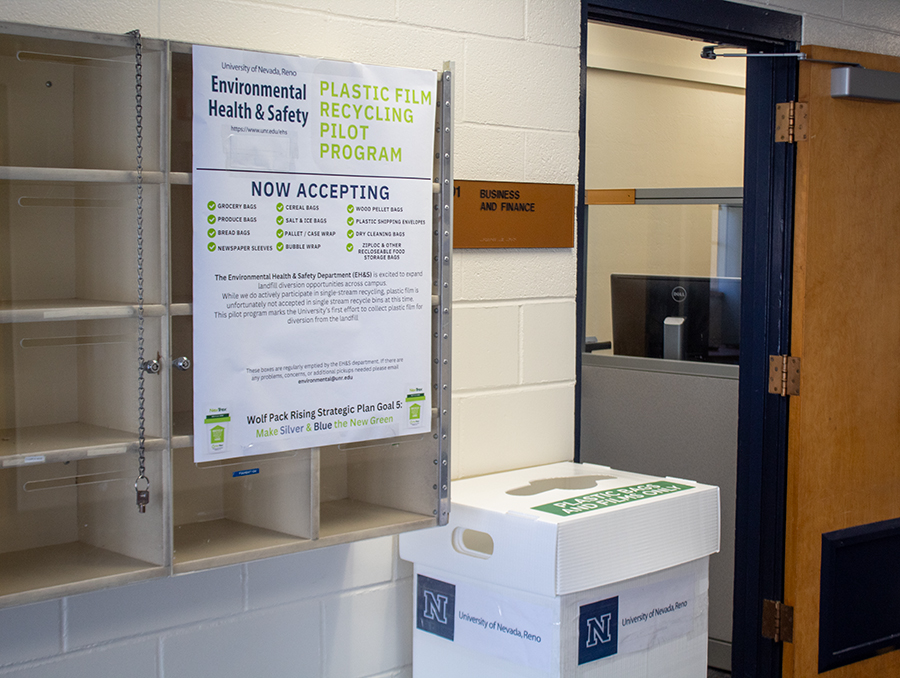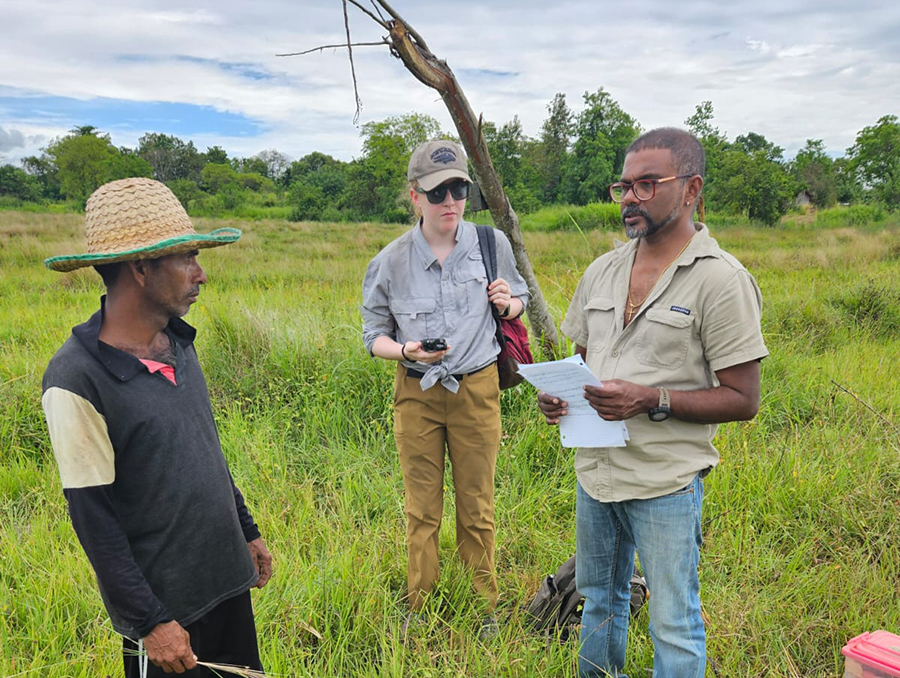In this first-person narrative, Nick Cheung, undergraduate researcher, tells Nevada Today about his experience in various research labs studying the microscopic world of neurons and molecules.
The first time I stepped into Associate Professor Jenny Ouyang’s lab during my freshman year, I found myself staring at a cage of zebra finches under a glow of artificial light, thinking, ‘Okay… how much trouble can a tiny bird get into?’ Little did I know, these tiny birds would teach me more about biology and research than I ever expected. That day, I learned that curiosity can bridge the gap to experience. Sometimes the smallest creatures reveal the biggest lessons, and this was my introduction to research through the Pack Research Experience Program (PREP).
During my freshman year, a friend told me about PREP, a program designed for students with little or no research experience. Even though I doubted I’d be accepted, I decided to apply. Turns out, the application was less time-consuming than I thought. It was more like a side quest, as I didn’t have to write long essays but instead just a few paragraphs here and there. Over winter break, I opened my email and saw the word “accepted.” I was thrilled and nervous. I would be working with Dr. Ouyang, studying circadian rhythms in zebra finches. I had no prior experience, but Dr. Ouyang and her lab were incredibly kind and supportive, guiding me through experimental design, data collection and analyzing how artificial light affects gene expression. PREP not only taught me hands-on research skills but also gave me confidence, a sense of curiosity and a reminder that mentorship can make all the difference.
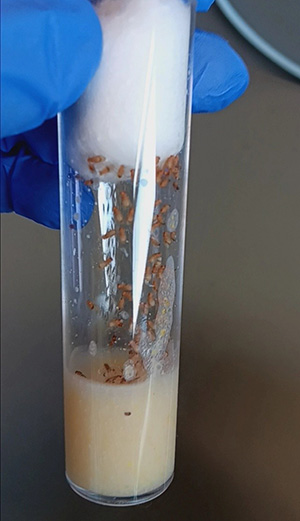
After getting a taste of research, I was drawn to pursue more advanced research, which led me to my current work in Associate Professor Jung Hwan Kim’s lab through the Nevada Undergraduate Research Award (NURA) program. Here, I study neurons in Drosophila, commonly known as fruit flies, focusing on Bruchpilot (BRP), a protein critical for synaptic function between the neurons that make up the brain of the creature. I’m investigating how different neurodegenerative disease models affect BRP expression and neuron length. So far, I’ve seen patterns like altered neuron length across diseases, with Huntington’s disease models showing a change in BRP expression. A major part of my project involves testing other protein’s influences on BRP localization in these disease models. This requires careful staining, imaging and quantification of expression in motor neuron cell bodies.
The work can be challenging and sometimes frustrating when nothing seems to work, but every experiment teaches me more about neurons, neurodegeneration and the research process itself. I’ve also been fortunate to have Ph.D. students in Dr. Kim’s lab guiding me. They’ve been incredibly patient and generous with their time, teaching me techniques, troubleshooting experiments and sharing tips that make the lab a place to really learn and grow.
Looking back, PREP was the push I needed to step into research, and NURA has helped me to build on that foundation. Both programs have taught me that progress isn’t always linear, mistakes are part of learning, the right mentors make all the difference and as long as you're truly curious, you can make up for your lack of experience. If you’re considering research, I highly encourage other undergraduate students to apply for PREP or NURA; you never know where it might take you. I know for me, it started with tiny birds and a few nervous looks, and now I’m exploring neurons in fruit flies, one synapse at a time.
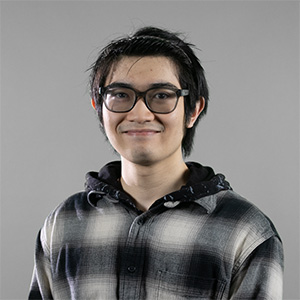 Nick Cheung, undergraduate researcher, three-time Undergraduate Research awardee and biotechnology major at the University of Nevada, Reno.
Nick Cheung, undergraduate researcher, three-time Undergraduate Research awardee and biotechnology major at the University of Nevada, Reno.About the author
Nick Cheung is an undergraduate biotechnology student at the University of Nevada, Reno, set to graduate in fall 2026. He has spent countless hours exploring the microscopic world of neurons and molecules, and plans to attend graduate school to keep asking big questions.
The fall 2025 Wolf Pack Discoveries symposium is scheduled for Thursday, Dec. 4, in the Joe Crowley Student Union Milt Glick Ballrooms. Student registration closes Nov. 23.
